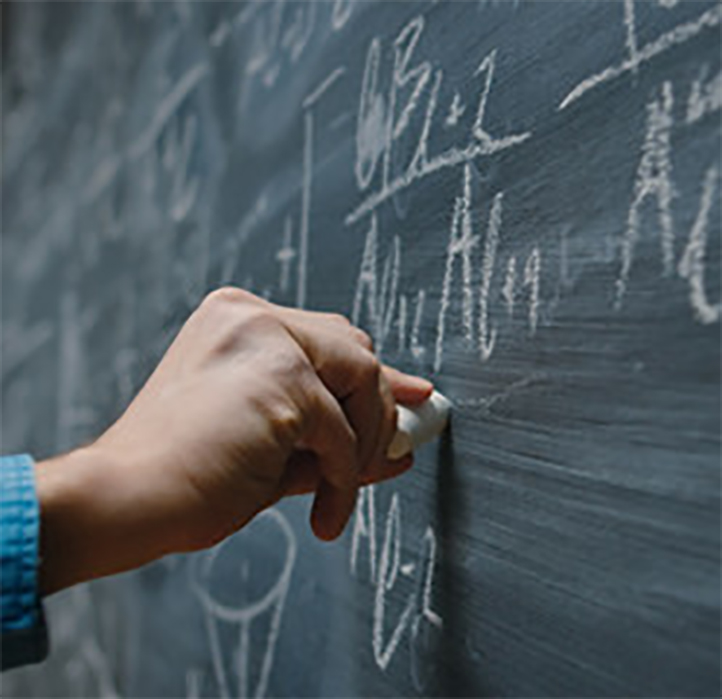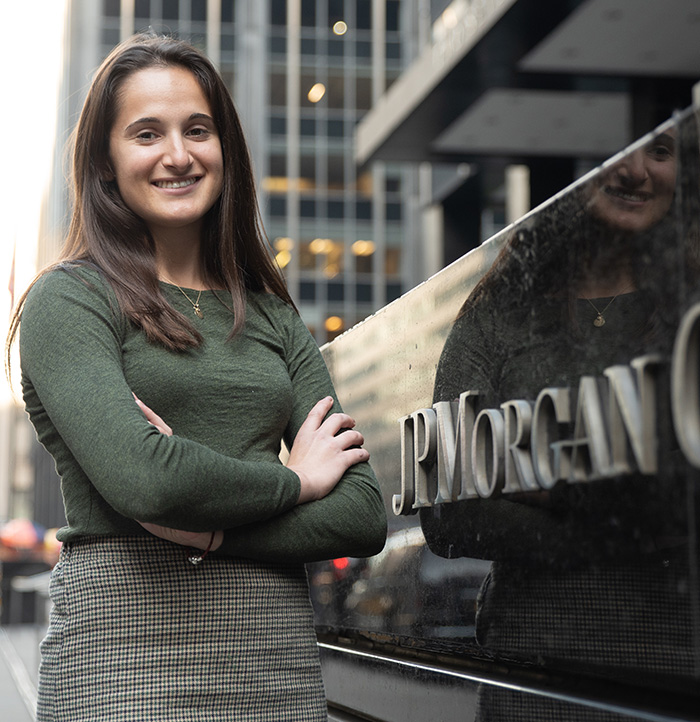
An undergraduate mathematics degree from Hofstra University opens up a world of career possibilities in business, computer science, engineering, the physical sciences, and education. With a thorough grounding in both pure and applied mathematics, a BA or BS in math from Hofstra will help you pave the way to a career in teaching, finance, industry, science, and more. If you have more specialized interests, we also offer programs in Mathematics with Business Applications and Mathematics with Science Applications.
Department Highlights
-
Attend the popular seminar series, featuring talks by visiting scholars.
-
Join co-curricular activities including the Mathematics Club, the Actuarial Science Club, and a campus chapter of Pi Mu Epsilon (the mathematics honor society).
-
Participate in the challenging problem of the month and the annual Putnam Competition.
-
Work as a peer tutor in the Mathematics Tutoring Center.

Degrees and Programs
BA or BS? Or a dual degree? If you are considering mathematics as a major, you will want to review the benefits of each available program. Browse through our course offerings.
A minor in Mathematics is also available.
The Department of Mathematics recently launched a Master of Science in Data Science, in partnership with the Department of Computer Science in the Fred DeMatteis School of Engineering and Applied Science. This graduate program provides a strong foundation in mathematical and algorithmic methods such as linear algebra, statistical inference, and optimization, advanced skills needed for successful careers in data engineering, quantitative research, machine learning, data mining, and data analytics.
BA Programs in Mathematics and Mathematics Education
-
Major in Mathematics
This program is designed to give students a comprehensive understanding of mathematics and a strong liberal arts foundation. It is appropriate for students planning to pursue graduate studies in another area, such as business, engineering, or computer science. -
Major in Mathematics Education
Courses in this program lead toward New York state initial teacher certification, mathematics, grades 7–12. Secondary education programs are designed to blend on-campus preparation with field experiences in a variety of school settings, culminating in full-time student teaching. Literacy, multicultural education, and information technology are integrated throughout all aspects of the program. The program conforms with the New York State Learning Standards in Mathematics, Science, and Technology and with the recommendations of the National Council of Teachers of Mathematics.
BS in Mathematics; Mathematical Finance and Computer Science and Mathematics
-
Major in Mathematics
The BS in Mathematics is appropriate for students planning graduate studies in mathematics or professional pursuits in the field of mathematics. The BS requires the completion of one of seven tracks: mathematics, actuarial science, applied mathematics, chemistry, physics, engineering, or computer science. More information on these tracks. -
Major in Mathematical Finance
The BS in Mathematical Finance is designed for students who are interested in finance and have the ability to dive deeply into mathematics. The program also provides an alternative for mathematics majors who find that they prefer a business-related program rather than a program in abstract mathematics. -
Major in Computer Science and Mathematics
For students wishing to enhance their job-finding potential in either field, the joint BS in Math and Computer Science requires the completion of 43 credits in Computer Science and 37 credits in Mathematics.
In addition to actuarial science track, we offer courses approved for Validation by Education Experience (VEE) by the Society of Actuaries in applied statistical methods, corporate finance, and economics.
Dual-Degree Programs
The following dual degree programs allow you to earn both an undergraduate and graduate degree in less time than if each degree was pursued separately.
Mathematical Economics Programs
These programs are housed in the Department of Economics:
BA in Mathematical Economics
The BA in Mathematical Economics focuses more on the use of analytical tools to understand broader economic issues. Students in this program often pursue careers in government, consulting, or academic research.
BS in Mathematical Business Economics
Students in the BS in Mathematical Business Economics use quantitative analytics to address specific needs in the corporate world, grooming themselves for careers as economists, actuaries, investment managers, financial planners, marketing managers, and more.
In the Classroom
Learn from the Experts
Professors create a nurturing and friendly atmosphere while maintaining high academic standards. They develop students' abilities to think mathematically and to become fluent and precise in expressing mathematical concepts.
One of our professors, Dr. Behailu Mammo, was the recipient of the 2023 Distinguished Teaching Award presented by the Metropolitan New York Section of the Mathematical Association of America (MAA). He was also voted Hofstra's 2020 Teacher of the Year for the School of Natural Sciences and Mathematics. Dr. Eric Rowland and Dr. Johanna Franklin, are recent recipients of Distinguished Teaching Awards from the MAA (for the years 2021 and 2018, respectively).

The Student Experience
We view mathematics as a collaborative venture, not a solitary pursuit. To that end, the Department of Mathematics offers a wide range of academic and social activities to promote a tight-knit and collaborative atmosphere.
In addition to the clubs and activities listed below, we have institutional affiliations with the American Mathematical Society and the Mathematical Association of America.
Clubs and Organizations
When they are not in class, our students socialize in our department lounge and in the Math Tutoring Center. Other ways to get to know your classmates and professors:
- The Math Club holds events several times each semester. Previous events have included trips to MoMath and movie nights.
- The Actuarial Science Club is a preprofessional organization for students who plan to become actuaries.
- Students may be invited to join the New York Alpha Lambda Chapter of Pi Mu Epsilon (PME), which engages in and sponsors a variety of mathematically related activities on campus. For information, visit the PME Home Page.
Competitions
A Problem of the Month is posted three times each semester. The first person to get a correct solution to Dan Ismailescu receives a certificate at Math Recognition Night.
Students participate in the annual William Lowell Putnam Mathematical Competition. This challenging test is given to undergraduates all over the United States and Canada. There are big bucks for the individuals and schools that do extremely well. For others, there are the honors and graduate school opportunities that come with being listed as one of the top 500 participants. Furthermore, there are prizes for the first and second place winners at Hofstra.
Kryptos is an annual cipher-breaking competition run by Central Washington University. Students may work either alone or in a team.
SCUDEM ("Student Competition Using Differential Equations Modeling") is a new modeling competition held in April.
Seminar Series
Math students are exposed to a broad range of current research and new ideas through a busy seminar program. Faculty, students, and guest lecturers discuss varied topics like Predicting Hospital Re-Admissions From Doctors' Notes; The Power of Padovan; A Mathematical Study of Malaria, with a Focus on the Mosquito Life Cycle; How Aliens Do Math; How Math Theory Can Help Break Up Terror Cells; Confessions of a Sequence Addict; and What Mathematics Can Tell Us About Cancer.
Internships
You can use an internship to explore a profession, to build your resume, and to earn money or credit (MATH 185 - (MA) Mathematics Internship). In a survey of recent math alumni, 56% of respondents reported that at least one internship was part of their experience at Hofstra.
Examples of places our students have interned include Brookhaven National Laboratory, Lieberman Research
Merrill Lynch, New York Community Bancorp, Inc., and The New York Times.

The Outlook
A math degree from Hofstra also prepares you to pursue advanced studies in a variety of fields — actuarial science, computer science, engineering, finance, law and public policy, as well as astronomy, atmospheric science, chemistry, physics, and neuroscience. More about alumni outcomes
100%
of recent alumni from the School of Natural Sciences and Mathematics responding to a survey reported that within a year of graduating they had landed employment or were pursuing or planning to pursue graduate studies.
89%
of those same surveyed alumni who reported employment, responded that they had landed their position at or within six months of graduation. Some examples of where our mathematics alumni are employed include:
- Huntington Learning Center
- International Leadership Charter High School
- JPMorgan Chase & Co.
- NPD Group
- Steve Madden Corporate
Graduate Studies
Examples of the distinguished institutions our graduates are pursuing advanced degrees include:
- College of Mount Saint Vincent
- Columbia University
- Hofstra University
- Molloy University
- New York University
- SUNY Stony Brook University
- University of California, Santa Barbara
- University of Connecticut
- Utrecht University
Contact Us
Department of Mathematics
306 Roosevelt Hall
Office Hours: 9 a.m. to 5 p.m.
Department Phone Number: (516) 463-5570
Fax: (516) 463-6596
E-mail
Department Chair
Associate Professor Sylvia Silberger
Room 315C Roosevelt
Phone: 516-463-5570
Email
Elementary Mathematics Course Coordinator
Professor Behailu Mammo
311 Roosevelt Hall
Phone: (516) 463-8693
Club and Organization Advisers
Math Club
Email Professors Dan Ismailescu or Eric Rowland
Actuarial Science Club
Email Professor Johanna Franklin
Honor Society - New York Alpha Lambda Chapter of Pi Mu Epsilon (PME)
Email Professor Gillian Elston
Additional Contact Information
Problem of the Month and the Putnam Mathematical Competition
Email Professor Dan Ismailescu
Kryptos Competition
Email Professor Johanna Franklin
SCUDEM
Email Professor Yihren Wu

